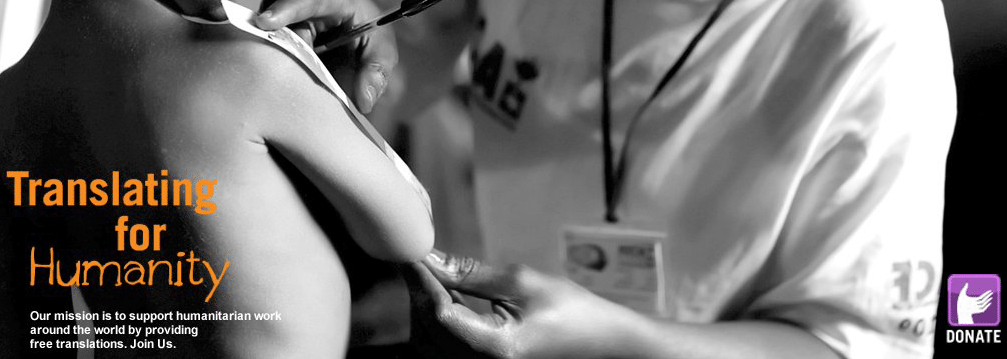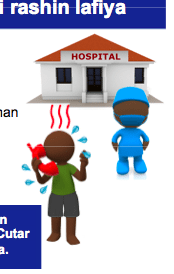 The Ebola virus is spreading rapidly in Liberia, Sierra Leone and the Republic of Guinea, with a handful of deaths now in Nigeria as well. Hysteria about Ebola is spreading rapidly in the United States, although to date only a single person in the U.S. has died of the disease. In Nigeria, rapid management of the virus appears to have successfully limited its spread (may it stay that way!), and the same should be true in the U.S. as well, despite initial blunders on the part of hospital administrators and workers. It’s clear that if the disease is to be kept from spreading further in the countries where it is already established as well as neighboring ones, management techniques are crucial, and in part that means making information about the virus readily available and circulated in communities that are particularly at risk. The disease spreads fastest in areas blighted by poverty and military conflict, both of which impede the circulation of information and treatment. Getting treatment to those who need it is a work in progress (with Doctors Without Borders, as so often, playing a crucial role), and the spread of information is a work-in-progress as well. Much of the information about the disease is circulating primarily in English – a language spoken only by a small minority of people in Sierre Leone and Liberia. This language barrier can be deadly. As Lori Thicke, the founder of Translators Without Borders, reports:
The Ebola virus is spreading rapidly in Liberia, Sierra Leone and the Republic of Guinea, with a handful of deaths now in Nigeria as well. Hysteria about Ebola is spreading rapidly in the United States, although to date only a single person in the U.S. has died of the disease. In Nigeria, rapid management of the virus appears to have successfully limited its spread (may it stay that way!), and the same should be true in the U.S. as well, despite initial blunders on the part of hospital administrators and workers. It’s clear that if the disease is to be kept from spreading further in the countries where it is already established as well as neighboring ones, management techniques are crucial, and in part that means making information about the virus readily available and circulated in communities that are particularly at risk. The disease spreads fastest in areas blighted by poverty and military conflict, both of which impede the circulation of information and treatment. Getting treatment to those who need it is a work in progress (with Doctors Without Borders, as so often, playing a crucial role), and the spread of information is a work-in-progress as well. Much of the information about the disease is circulating primarily in English – a language spoken only by a small minority of people in Sierre Leone and Liberia. This language barrier can be deadly. As Lori Thicke, the founder of Translators Without Borders, reports:
The Ebola communication failure was recently highlighted by UNICEF, Focus 1000 and Catholic Relief Services. In September the organisations reported that in Sierra Leone – one of three West African nations at the epicentre of the outbreak – nearly a third of the people believe Ebola comes from mosquitoes, or the air. Almost two-thirds could not identify the ways to prevent the disease.
 She also notes that cultural traditions in some affected areas (such as bathing the bodies of deceased family members) currently encourage the spread of the disease, which is easily transmitted via physical contact with those infected, even after death. Without clear information about the risks of contact and ways of preventing infection, many remain at risk. So Translators Without Borders has launched a new project in conjunction with International SOS to get information about Ebola translated into the languages of the countries where the virus is currently spreading, with an emphasis on the languages most widely spoken. “For example,” Thicke explains, “there are 522 languages spoken in Nigeria, but only three – Hausa, Yoruba and Igbo – will reach over 65 per cent of the population.”
She also notes that cultural traditions in some affected areas (such as bathing the bodies of deceased family members) currently encourage the spread of the disease, which is easily transmitted via physical contact with those infected, even after death. Without clear information about the risks of contact and ways of preventing infection, many remain at risk. So Translators Without Borders has launched a new project in conjunction with International SOS to get information about Ebola translated into the languages of the countries where the virus is currently spreading, with an emphasis on the languages most widely spoken. “For example,” Thicke explains, “there are 522 languages spoken in Nigeria, but only three – Hausa, Yoruba and Igbo – will reach over 65 per cent of the population.”
I spoke directly with Rebecca Petras of Translators Without Borders, who said that the small TWB team is currently working overtime to raise funds to get information about Ebola translated into the languages spoken in Sierra Leone, Liberia and Guinea. Much of TWB’s previous work has been volunteer-driven, and this time too they are grateful for any volunteer translators who can help: information on how to volunteer is posted on the organization’s website. But since it’s difficult to recruit enough professional translators who specialize in West African languages, TWB is taking a different tack. As Petras explains, “We need to take our rapid response translator training that we have created in Nairobi, Kenya, package it, and train bilinguals in Krio, Mende and maybe Fula. With that, we will create Rapid Response Translator teams for these languages.”
TWB, she says, is concentrating on creating “simple posters and audio public service announcements, because radio and community meetings are the most important means of communication in the most affected areas. In these areas, only 10 percent say they get info from mobile [Internet] (this is different from other cities in Africa, such as Nairobi or Accra).” I hope TWB can succeed in saving lives by getting information about the disease into the hands of those who most need it.
If you’d like to  help but don’t speak one of the languages in question, please consider a donation to TWB to contribute to the costs of producing and disseminating materials in the region. Petras says a new page for the TWB website explaining the Ebola project and requesting donations will go live in a day or two, but until it does you can contribute via the TWB’s regular funding page. [Update: the TWB Ebola project page is now live.]
help but don’t speak one of the languages in question, please consider a donation to TWB to contribute to the costs of producing and disseminating materials in the region. Petras says a new page for the TWB website explaining the Ebola project and requesting donations will go live in a day or two, but until it does you can contribute via the TWB’s regular funding page. [Update: the TWB Ebola project page is now live.]
Meanwhile, have a look at TWB’s Ebola info sheet in the Hausa language. This is a translation of International SOS’s English-language info sheet. TWB is hoping to have the same material translated soon into Krio and Mende to distribute in the areas of Sierra Leone worst affected by the outbreak. If you’re able to help out with translations, visit TWB’s volunteers page or contact the organization directly here.

